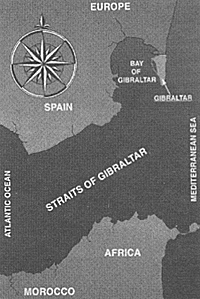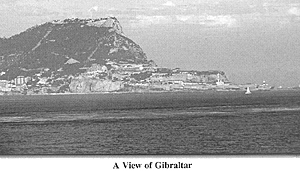The Rock Against Napoleon:
The Importance of Gibraltar
to the Napoleonic Wars
Introduction
by Cole H. KeKelis, USA
| |
Gibraltar is positioned at the western gate of the Mediterranean; the tip of the peninsula lies only fourteen miles from Mount Ceuta on the coast of Africa. Here, Europe and Africa are separated
by only a few miles. [2]
Together, Gibraltar and Mount Ceuta are referred to in antiquity as the Pillars of Hercules, for the ancients believed that it was Hercules who pushed open Mare Nostrum (the Mediterranean Sea) and exposed it to the deified Ocean (the Atlantic) which bounded all land. The Phoenicians were the first to take any real notice of Gibraltar. It was from their language that the first recognizable name for the
Rock came into being, for the ancient Greeks referred to it as Calpe, which was derived from a Phoenician word, kalph. The Romans retained the Greek name, and in those days the Rock was regarded as a place sacred to Hercules.
The ancient Roman slogan regarding Gibraltar was Ne Plus Ultra, roughly translated as ‘there is nothing more beyond this point.’ Indeed, to the ancient Roman, to pass beyond the Pillars of Hercules meant to enter into Ocean, which was frequented by the gods. The Arabs spread into Spain during the Dark Ages, and by the ninth century A.D., they referred to Gibraltar as Djabal Tarik, the Mount of Tarik. Corruption of the Arab name, Djabal Tarik, produced the more modern appellation of the Rock, Gibraltar. The Spanish and Arabs fought over Spain and the Rock for centuries until the Spanish finally gained control of Gibraltar during the Reconquista movement.
The English first took notice of Gibraltar in the seventeenth century, and by 1704, the English had taken the Rock from Spain. By the Treaty of Utrecht, signed 1713, “The Catholic King” of Spain ceded “for himself, his Heirs and successors,” to the “Crown of Great Britain the full and entire property of the Town and Castle of Gibraltar, together with the Port, Fortifications, and Forts thereunto belonging ... to be held and enjoyed absolutely ... for ever, without exception or impediment whatsoever.” [3]
Despite this seemingly final cession, the Spanish would, in blatant defiance of Utrecht, make further attempts to regain control of Gibraltar. The Great siege of 1779-1783 was the fourteenth and final siege in Gibraltar’s long history. But the British held fast to the Rock, and they have since continued to keep a firm grip upon “The First Outpost of the Empire.”
When Great Britain seized Gibraltar in 1704, she was taking her first step toward the total maritime domination and status of “Top Nation” enjoyed by England from Trafalgar (1805) to the end of
the Great War (1918). [4]
Historians have, for the most part, acknowledged the vital role played by Gibraltar in the history of the British Empire. G.T. Garratt, John D. Stewart, Ernle Bradford, H.W. Howes, Maurice Harvey and Sir William G.F. Jackson have all contributed to the literature of the subject, and each of these authors has adopted a position affirming Gibraltar’s importance. Some of these historians have done so in more patriotic and colorful terms than have others, but there can be detected in all their works the theme of Gibraltar as the “Keystone” to the British Empire [5]
; for, so long as Britain should be on the Rock, Browning’s “grand and grey” Gibraltar, then Britain would hold the gate to the Mediterranean, an advantage which has manifested itself
time and again in history. [6]
As noted by the great American naval theorist of the nineteenth century, Alfred Thayer Mahan, “Circumstances have caused the Mediterranean Sea to play a greater part in the history of the world, both in a commercial and military point of view, than any other sheet of water of the same size. Nation after nation has striven to control it, and the strife still goes on.”
[7]
Authors such as George Hills have downplayed the role of Gibraltar in history, and others, such as Quentin Hughes, have adopted a more or less neutral, analytical stance. Despite the abundance of literature on the subject, the role played by Gibraltar in bringing about the downfall of Napoleon has largely been overlooked. Gibraltar in the Napoleonic Wars is a vital subject of study, for through careful study of the period, one can identify major contributions made by the Rock which directly or indirectly lead to the demise of Bonaparte. Indeed, Gibraltar was a “Keystone” in the British defence and offense against the Emperor of the French, as the present study will show. A proper treatment of the subject is, therefore, essential to a true understanding of the entire period.
Gibraltar played many roles during the Napoleonic Wars. The broad functions of the Rock can be divided into three categories: military, strategic and economic. The first of these areas of discussion deals with Gibraltar’s direct involvement in military affairs during the Age of Napoleon.
The second category, strategic contributions, treats the many indirect functions of Gibraltar, such as repair station and victualling yard, all of which, in their own ways, assisted in the downfall of Bonaparte and made possible the participation of Gibraltar in broader activities. The final section, economic importance, provides an in-depth discussion on the economic functions of the Rock in the Napoleonic Age. Always, the emphasis is upon Gibraltar against Napoleon.
The Rock Against Napoleon The Importance of Gibraltar to the Napoleonic Wars
|
 From its position at the gateway to the Mediterranean, Gibraltar has served Britain admirably during her three centuries of occupation. For example, during the Napoleonic Wars, Old “Gib.” was to play an essential role as key to Spain and the Mediterranean and would contribute significantly to the demise of Napoleon Bonaparte. Gibraltar is a small peninsula jutting out from the southeastern coast of Spain. It is about three miles long and is connected to mainland Spain by means of a narrow, sandy isthmus one thousand yards wide at its narrowest point. The legendary Rock of Gibraltar, which rises out of this peninsula, is 1400 feet at its greatest height and has a circumference of about seven miles. [1]
From its position at the gateway to the Mediterranean, Gibraltar has served Britain admirably during her three centuries of occupation. For example, during the Napoleonic Wars, Old “Gib.” was to play an essential role as key to Spain and the Mediterranean and would contribute significantly to the demise of Napoleon Bonaparte. Gibraltar is a small peninsula jutting out from the southeastern coast of Spain. It is about three miles long and is connected to mainland Spain by means of a narrow, sandy isthmus one thousand yards wide at its narrowest point. The legendary Rock of Gibraltar, which rises out of this peninsula, is 1400 feet at its greatest height and has a circumference of about seven miles. [1]
 The Rock contributed greatly to the acquisition of this century of naval supremacy. The present study explores in great detail those contributions made by Gibraltar which served to undo Napoleon Bonaparte, chief enemy of Britain in the late eighteenth and early nineteenth century.
The Rock contributed greatly to the acquisition of this century of naval supremacy. The present study explores in great detail those contributions made by Gibraltar which served to undo Napoleon Bonaparte, chief enemy of Britain in the late eighteenth and early nineteenth century.